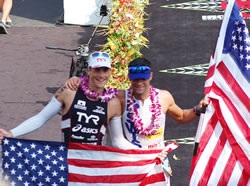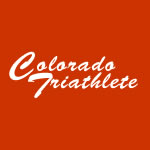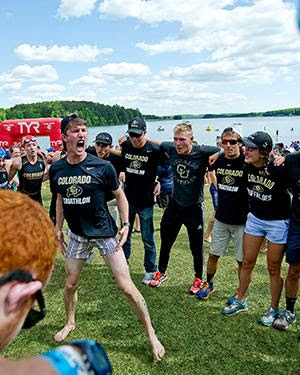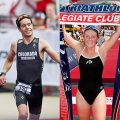Triathlon Team
Interview by Adam Hodges
ISSUE #10, April/May 2001 – First off, could you talk a bit about your background in multisport–I see on your coaching resume that you raced as a professional cyclist and competed in swimming, cycling, cross country and track in college. Where did you go to school and did your interest in triathlons stem from a background in the individual sports or vice versa?
I got into sports my senior year in high school when my family moved to the US from Germany. I joined the CC, swim, and track teams at my high school, then continued competing (CC, track) at Case Western Reserve University. We were a pretty small division 3 school and had a total of five women on the track team! It allowed for lots of diversity though. I must have competed in most events at least once – 100, 200, 400, 800, mile, 100 & 400 hurdles, long jump, high jump, javelin, shot put… My senior year, I bought a touring bike thinking that some day I would like to try a triathlon. After graduating, I went to Stanford for grad school and joined the cycling team. I thought it would be a good way to get prepared for a tri, but when I qualified for Nationals my first year, I postponed my triathlon ambitions. I stayed with cycling and was National Champion (Team Time Trial) and Collegiate All-American the next two years. After finishing my PhD, I raced full-time for a few years, then “finally” ended up competing in triathlons when I retired from bike racing.
As an athlete yourself, what races are you focusing on this season?
As first and foremost a coach, I need to work my own goals around those of my athletes. The only race that I have committed to for selfish reasons is the Escape from Alcatraz – I did it last year and had a blast. For the rest of my races, I select ones based on where my athletes are going. This year, I’m traveling to a number of races with some of my individual athletes and the CU Tri Team, such as the Hoff&Leigh Winter Triathlon, Cherry Creek Time Trial Series, Rocky Point, and Wildflower (I’ll do the Long Course the day before the Collegiate National Championships). It also means that I really don’t set any particular performance goals but get to focus on my athletes before, during, and after the races. I love doing the races (I think once you are a competitor you are always one), but I won’t, for example, stress about arriving at WF six hours before race start. Starting in June I’ll be managing teams, though I hope to fit at least a couple of races depending on my schedule.
When did you get involved in coaching? And how has that involvement evolved over the years?
My first coaching job was as the Assistant Coach for the Stanford cycling team. I was in charge of recruiting riders (two of them went to Olympics ’00) and leading team workouts. I enjoyed pretty much all aspects of coaching and it seemed natural to pursue it. It also helps that I am a bit of a perfectionist and very organized (maybe it’s my German background J ). I have been coaching cyclists since then – in the beginning mostly helping out teammates with their training, later designing training for others as well. I continued to educate myself as a coach and decided to pursue coaching as a full-time career after I retired from bike racing. I’m now certified as USAT Level II Coach, USCF Expert Coach, and Personal Trainer and Nutritionist. My individual athletes are triathletes, road and track cyclists, and a mountain biker. And of course lately, I have been very busy coaching the CU tri team. I’m very happy to have gotten the coaching position with them: It is a great experience to be working with student-athletes who not only need to stay on top of their schoolwork and training, but who are the driving force ensuring the existence of their team (whether that’s organization, fund-raising…).
Tell us about your role with Total Trainer. How do you use the training software as an athlete? As a coach?
I’m the Director of Coaching for Total Trainer and responsible for designing the overall features of the program. I listen to what athletes and coaches need in an advanced training program like Total Trainer and work with the software developers to make sure that program meets the needs of the athlete and is easy to use. Total Trainer is an invaluable tool for planning and evaluating my own training and the training of my athletes. As an athlete, I can log my training, analyze my performance, and keep track of my heart rate zones, nutrition, benchmark testing, event planning, etc… As a coach, I am able to review each of my athlete’s logs using the built-in exchange and synchronization functions. This allows me to develop a unique, detailed training plan for each athlete and review their progress. I can recognize how they are responding to a given training cycle and adapt their plan accordingly. As a coach you need to pay a lot of attention to detail and daily feedback in order to come up with a training plan that is right for that athlete. Total Trainer makes this possible.
You took over the role of head coach of the CU triathlon team last fall. The team has essentially dominated the collegiate championships at the Wildflower triathlon throughout its history–the Buffs have won six national championships since 1994, including the last five years in a row. Each year, the Buffs seem to better their previous course record. What was it like coming into a program like that and how do you coach a program with such a large number of athletes and a variety of levels?
Neal Henderson and Rick Ellison did a great job with the team in previous years. I was also amazed by how well organized the club is and I can’t thank the officers and assistant coaches enough for all the great work they are doing with the team.
As in previous years, the team continues to grow — this year, we have 136 members on the team — about 90 of them will be going to Wildflower! The athletes’ ability levels vary greatly: several members of the team are pros or on the verge of turning pro, some are on the Junior National Team, many others have never done a triathlon before. We also have a sizeable group of members who are preparing for the Half-IRONMAN and IRONMAN distances. I tried to meet with every athlete individually when I first joined the team so I would be able to get to know them, know about their athletic background and their goals.
We offer six team workouts every week: Monday swim, Tuesday run, Wednesday swim, Thursday ride, Saturday ride, and Sunday run. Each workout is designed to challenge the athletes, no matter what their ability level, by varying time/distance and intensity. In the fall, we focused a lot on the beginning triathletes teaching the basics and building a base. With the spring semester, the intensity of many of the workouts has picked up and I’m seeing some healthy competition within the team during the workouts. One of the biggest benefits of being on a team is having training partners!
How is this year’s team looking in preparation for Wildflower? Tell us little bit about the training they have done, especially during a cold winter, to prepare to race against strong teams from California and Arizona that may have a bit of an advantage training for the early season race.
I am really pleased with the training that the team has done this year. We developed a good base in the fall semester, then touched back on base training for a few weeks after Christmas break to prepare everyone for the increased intensity and to avoid injuries. During late January, February, and part of March, the team did Lactate Threshold training (I usually plan training in 4 week mesocycles, with the fourth week as a rest week). Because Wildflower is a hilly course, I also planned in one VO2max cycle for March/April, before the team starts tapering. Overall, I have been impressed with the training commitment of the Buffs whether the run is on a snowy track or the ride on wet roads at 35degrees. I think that this determination to participate in a workout no matter what the conditions shows that we are strong and ready to take on the “warm-weather teams.”
What do you feel are the team’s strengths going into another national championship defense?
This will be an interesting year for us at Wildflower. We will return without any of the top scorers from previous years, yet, our men’s team may even be stronger than it has been in previous years. We have an incredible pool of talented athletes who are strong in all three disciplines and I expect will push each other during the entire race. It may well be that for the men it becomes a team event, even though it’s non-drafting, because their training partners are near. Our women’s team is showing promising performances, though it is a bit of a rebuilding year for them.
What top athletes are returning this year for CU? What athletes, both for the women and men, should we be watching this year?
Regrettably, we lost our top three men and top three women from previous years either to graduation, turning pro, or the overlapping final exams.
The women’s team will be lead by Kerrie Wlad and Erin Huck, who were ranked 7th and 8th amongst the CU women at WF’00. Other top athletes to watch out for are Amber Hofsted, Megan Clute, Julie Durham, and Molly Rusch.
The men’s team will be lead by Ryan Ignatz, Assistant Cycling Coach, who was the 4th finisher among the CU men at WF’00, and Andy Feeney, Assistant Swim Coach, who competed at WF in ’99. They will find strong teammates in returning members Lucas Llado (6th among the CU men in ’00), Armando Galarraga (8th), Bryan Taylor (12th). Other Buffs to look out for are Blake Ottersberg and Lance Panigutti (both members of the Junior National Team), Keith Jackson, Tim Smith, Kai Costanzo, Jeff Cormack, Bill Baker, and Jose Garcia.
The logistics of traveling to California for Wildflower can be a huge obstacle, especially since the race is in the middle of final exams this year. How has this affected things and what kind of support has the team received from the school?
It truly is a huge obstacle. First of all, several of our top athletes can’t even go to the National Championships this year due to their finals schedule. It also makes everything incredibly expensive because we need to fly rather than drive. So we have spent a fair amount of time this year with fundraising, but even so the athletes still have to come up with a significant portion of the expenses themselves.
The other difficult factor is timing: It is a four hour drive to WF from the San Francisco airport, but because finals are scheduled even for Saturday, we are flying out on Friday afternoon, arriving at the campsites hopefully by 11pm. That gives the athletes one day to prepare for the race, put their bikes together, and check out the race course. After the race, we have 1-2hrs to pack up and load everyone in the bus to get to the airport on time Sunday evening!
How many athletes will be competing for CU in this year’s collegiate championships?
We are taking a total of 88 Buffs to Wildflower! 76 athletes will be competing in the collegiate championship, another 12 athletes (including Pros Terri Duthie and Nick Cady) will be competing in the Long Course.
What teams will CU have to look out for?
This year, the team competition should heat up from previous years – many of our competitors have grown exponentially. Our biggest competitor and rival will be Cal Poly SLO which is returning with a strong men’s and women’s contingent this year. Because there is very little competition prior to Nationals, it’s hard for me to predict the strengths of the other teams except for basing them on last year’s results and this year’s returning athletes.
Although Wildflower is the national collegiate championship and the main focus of the season for the team as a whole, it’s timing at the beginning of May really makes it more of a season opener for most athletes. Over the past several years as the program has grown, more support has evolved for team members during their summer seasons. What are some other races throughout the summer that are key events for the team or members of the team?
Keep your eyes open for the Buffs at Boulder Peak, Lubbock, the 5430 Triathlon, Age Group Nationals (and Worlds), some of the XTERRA races, IRONMAN Canada, as well as the many regional races throughout Colorado and the western region.
Thanks and good luck at nationals!







